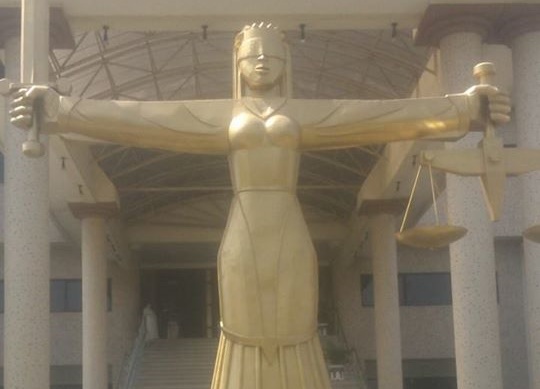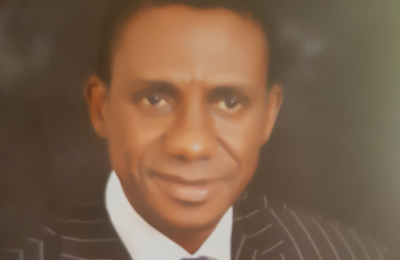Recently, a professional colleague of mine referred his friend who wanted my possible intervention in a matter of urgent importance (to the one that needed help). On arrival in my office, the man introduced himself as “Pastor ….” With that appellation of a clergy, I listened with keen interest and hopedI could be of assistance, provided it was within my powers. The man revealed that a particular law enforcement agency had arrested his boys while on a ‘business’ trip and therefore requested if I could facilitate the ‘release’ of exhibits confiscated during the arrest.
Though I was shocked at the request, I had to conceal my emotions and still calmly explain that exhibits are vital to investigation and prosecution of criminal cases, hence no agency worth its salt would grant such request unless it is done with the intent of compromising the case.
Most importantly, the request was beyond my powers beside the fact that it was illegal. I heaved a deep sigh of relief and this issue got me thinking even after the man left my office perhaps disappointed.A thought dropped in my mind: a country of sins without sinners!
To say that Nigerians are among the most religious people on earth is to state the obvious. This is evident in the number of churches and mosques littered almost every nook and cranny of the country. As religious people, we often have religious explanations to almost every happening, circumstance and ailment, except that we are yet to record ‘healing miracle’ for any of the COVID 19 patients since the outbreak of the pandemic in Wuhan, China sometime in December 2019.
We are quick to resort to prayers for even mundane issues that require common sense, strategic thinking and right leadership. It is bad to the extent that some government agencies even engage the services of ‘prayer warriors’ (methinks religious contractors) in search of lasting solutions to the spate of insecurity in some parts of the country and other challenges.
Sadly, we thought perhaps, we could through prayers find solutions to issues that competent and rational leaders in civilized countries tackle with mere strategic thinking and exemplary leadership. Meanwhile, over 21 years after return to democracy in 1999, we are still waiting on God to break the jinx of persistent epileptic power problem of the country.
Presumably, religiously inclined successive leaderships of the country would never agree with the likes of Galileo Galilei, the father of modern physics when he opined that ‘I do not feel obliged to believe that the same God who has endowed us with sense, reason, and intellect has intended us to forgo their use’.
The adjective, ‘religious’ means faithful devotion to an acknowledged ultimate reality or deity. Whether or not most of the religious fundamentalists and fanatics are faithfully devoted to the deity or Supreme Being they claim to worship is another kettle of fish entirely. I believe the central themes of major religions are faith in a Supreme Being, morality and love toward God and humanity. If this is the case, particularly for the adherents of Christianity and Islam, how come we have incessant religious crises, wanton killings and destruction of property in the name of religion.
Ironically, most Nigerians are pious only on Sundays and Fridays and perhaps to a large extent, in their private affairs. When it comes to public service, especially when money is involved, you dare not bring God into it.
Regrettably, most public offices in Nigeria where monumental stealing, nepotism, embezzlement, looting of public treasury among other vices are perpetrated are populated by adherents of Christianity and Islam, the 2 major religions in the country. This assertion can be further validated considering the number of accused persons facing criminal trials in courts or those who are yet to be held unto account.
Hardly would you hear of involvement of adherents of African Traditional Religions(ATRs) or atheists in cases of looting of public treasury, extreme ethnic hatred, nepotism etc except for intermittent ritual related cases. This is not to say that there is anything wrong in professing faith, neither am I saying that adherents of ATRs and atheists are saints. The uncomfortable truth is that a person’s character is shown through daily actions in life not where they sit on Sunday or observe their daily salat. Like Bibi Bourelly, a young American – German singer and songwriter, I can deal with imperfection, but I can’t deal with people who lie to themselves and lie to the world to make the world feel better.
The stark reality in Nigeria sadly suggests that the higher the number of religions in a Nation, the higher and more compounding, degenerating and endemic social vices therein. The paradox is that a nation of religiosity devoid of godliness and morality is bound to be distressed by religion. Most often, religion and politics are complicatedly mixed all over the world thereby making it difficult to differentiate their respective boundaries at a given time.
Mindful of this conundrum, Nigerian politicians find it convenient to deploy ethnic and religious schemes in pursuit of selfish political ends. They therefore confirm William Hazlitt’s assertion that the garb of religion is the best cloak of power. I observe with dismay that the only time religion and ethnicity become inconsequential amongst the ruling Nigerian elites is when it comes to sharing of ‘National cake’. On the other hand, when any of them is called to account, it becomes a case of ‘persecution’ on ethnic and religious grounds.
Undoubtedly, Nigerians are among the most religious people in the world.In practice of their religious faith, they usually embark on pilgrimage to Mecca, Israel, Rome and other holy sites of the world, hence we are not in short supply of gold plated tooth ‘Alhajis’ and ‘JPs’ in Nigeria. You dare not omit their appropriate religious titles when addressing them.
To corroborate this assertion, report by Al Jazeera revealed that out of 2 Million Muslims that converged on Mecca and its surrounding areas to perform Hajji in 2017, Nigeria, my beloved country was ranked number 7 with 79,000 pilgrims amongst the countries with the highest number of pilgrims behind Indonesia, Pakistan, India, Bangladesh, Egypt and Iran in that order. Please note that this figure is moderate perhaps for strict restrictions emplaced by the Ministry of Hajj and Umrah of Saudi Arabia on the number of pilgrims allowed into the country per time.
During the same period under review, Israel recorded 3.5 Million Christian pilgrims from different countries. This is beside the number of Catholics that flock Rome for similar religious ritual. China on the other hand was ranked in 2020 as the least religious country in the world with only 10% of her residents having religious inclination and over 60% as convinced atheists. Other least religious countries are Japan, Sweden, Norway, and Netherlands among others.
Needless to compare the level of development and crime rates in those countries with that of a religious country like Nigeria. It is against this background that I hold the firm view that government at all levels in Nigeria has no business sponsoring any religious activities including pilgrimage. They should rather concentrate on the primary objective of government as stipulated in Section 14 (1) (b) of the 1999 Constitution of the Federal Republic of Nigeria (as amended) which is the security and welfare of the people. Besides, it would be difficult for anybody to convince me on the benefits of pilgrimage by government officials or citizens given the prevailing circumstances in the country. In fact, anybody is free to go on pilgrimage as many times as they want in a year provided it is at their personal expense.
Furthermore, there is no gainsaying that corruption is at the root of Nigeria’s underdevelopment and myriad of challenges. Expectedly, most of the perpetrators of these heinous crimes are neither atheists nor adherents of indigenous African Traditional Religions: instead, they are professed Christians and Muslims. The irony is that some of them even pay tithes, give offerings and do thanksgiving using stolen money–meant for building infrastructure and other legitimate purposes. We believe we can legitimize such illicit wealth through religious atonement.
For the avoidance of doubt, corruption, according to Transparency International (TI), the coalition against corruption, is defined as the abuse of entrusted power for private gain. It is described from a global perspective as monopoly plus discretion minus accountability. Obviously, the anti- corruption watchdog in 2019 ranked Nigeria 146 out of 180 countries in terms of corruption perception. This is despite the effort of President Muhammadu Buhari led administration and the ubiquitous places of worship in every corner in Nigeria.
Ours is that of religion without morality. In the words of a former American Executive, Mark Hopkins, religion without morality is a superstition and a curse, and morality without religion is impossible. The Nigerian version of religion in my view, is devoid of morality: we can donate to churches/mosques even when we have a hungry neighbour or relation next door who desperately needs assistance. It is in this regard that Ode S. Robert Et all opined that at the heart of Nigeria’s woes are institutional sins. To them, sin, in its many forms is the cause of the distressed condition of the country.
The thrust of this paper therefore,isn’t that there is anything wrong in professing religious belief, rather, it is incumbent on adherents to practice the tenets of their religious beliefs. It is not enough to profess faith but they must demonstrate such religious belief not just in their personal lives but most importantly in their interpersonal relationships with other people as well as in their conduct of official and government businesses.
It is my submission that you do not need religion to have morals. If you can’t determine right from wrong then you lack empathy and not religion. I can’t but agree with Abraham Lincoln on his religious ideology that “When I do good, I feel good; when I do bad, I feel bad and that is my religion.”
– Benjamin Atanu Achimugu, Esq writes from Abuja.
Email: benjaminachimugu@nigerianbar.ng




